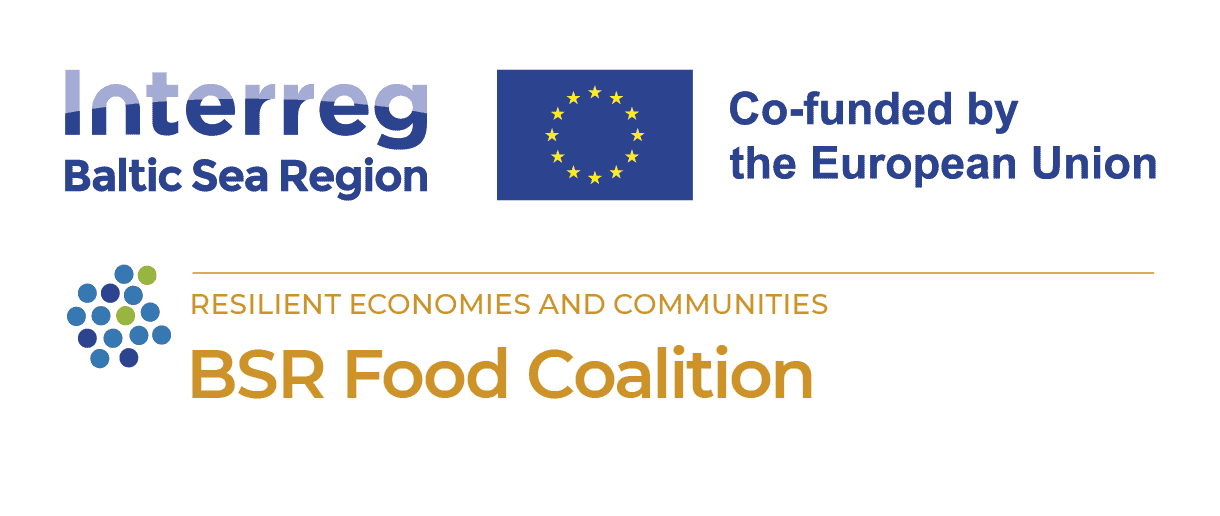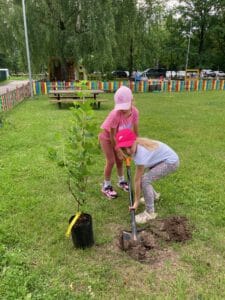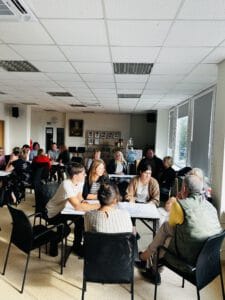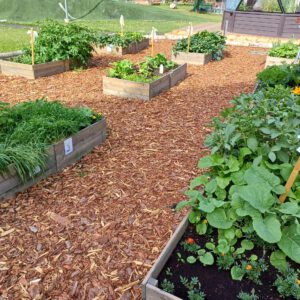
The Farm to School grassroot movement is taking off
23 October 2024
When five regions in the Baltic countries joined forces and took the step to explore the opportunities of developing Farm to School programmes in own regions by learning from one another, it resulted in a transnational multi-stakeholder engagement, with an increased interest about purchasing local foods to serve in school canteens, and establish new cooperation initiatives with local and organic food producers.
Our goal
At the beginning of the project in autumn 2022, we conducted a survey in each project region – Klaipeda, Latgale, Kurzeme, Tartu and Voru, that resulted in high level engagement of our target- and stakeholder groups at the very start of our Farm to School mission. Participants from local and regional municipalities, school food service staff, teachers, administrators, local farmers, students and parents took part of the survey. Our goal was to identify the common needs and common grounds for local school food transformation. This survey was the core driver of our piloting activities, and served as a foundation to bring together municipalities, farmers and school representatives in each region, to the very first Farm to School roundtable discussions.
This is how we did it
The first step was to put into the spotlight the need of the Farm to School solutions, this we managed to do through the survey work. The next step was to develop piloting activities together with our target- and stakeholder groups, and have their commitment of engagement for the implementation phase.
We successfully implemented test beds (pilots) in each project region. Each partner with the flexibility to adapt to own think-out-of-the-box ideas and local context. We focused on training of school cooks, food education at schools, connect farmers and municipalities, and increase political commitment of decisions-makers.
The summary of targeted activities in the pilots provided a framework for how to achieve the goal we have set. The background of all activities was the collection of opinions and recommendations at gatherings of different target groups and taking them into account when planning activities (organic and local producers, school cooks, school principals, and local government managers).
Challenge
The main challenge was the time limitation due to workload, and the decision-making of our main target groups – municipalities and farmers, that prevented a “faster” desired engagement.
For example, in Võru County, the biggest challenge was to introduce a completely new topic of local organic food to educational institutions. In the process, it was very important to exchange with other regions, and to cooperate with the school cooks to find common ground in order to achieve results.
In Kurzeme and Tartu, involving farmers was the main challenge. There is a lack of interest in general for farmers to take part of the tender process, and the current procurement system and legislations don’t have the flexibility needed in order to engage SMEs in the Farm to School supply chain.
Majority of schools in Klaipeda region have catering services, external contract-based businesses that supplies to most of the schools in the region. This makes it difficult to implement Farm to School programmes.
In Latgale, there is a skepticism of stakeholders that are directly involved in school food system, that the current system can’t be changed. The basis of the system is to look good on paper if calories and nutritional standards, and product groups are met, and that most kids eat the food, while completely ignore the children who do not eat the school food. As long as the vision that every child in school and kindergarten is fed is not prioritised, it is difficult to bring about real change in the system.
“The activities carried out within the project have shown that the Farm to School programme has great potential as a valuable solution to numerous challenges in the Latgale region and throughout Latvia. These challenges include supporting local organic farmers, streamlining food supply chains and promoting healthy eating habits among children and parents. By encouraging students to eat healthier both at school and at home, and by motivating school cooks to improve their skills, the programme promotes the preparation of modern, nutritious meals that benefit all students, not just certain groups”, says Rita Ivanova, Project Manager at Latgale Planning Region.
Despite the challenges, our motivation has been that we have managed to raise the issues and the need for school food transformation at the national level in Lithuania, Latvia and Estonia, and that it should be a priority for our governments. This includes putting locally grown and produced food on the plates of the schoolchildren. We are determined to continue as we believe that one day the desired changes will occur and that we, our project regions will already be prepared and react quickly and efficiently to these changes.
Without the BSR Food Coalition project and the co-financing of the Interreg BSR programme, the process towards Farm to School transition would been so much slower.
Result and achievements
The BSR food coalition project has been a catalyst for the school food topic transformation. Thanks to this project and piloting activities, we’ve been able to identify where most interventions are needed, efficiently scale up Farm to School programmes, make a wider impact and cooperate more efficiently transnationally with a clear structure and joint interventions.
Some of the examples:
In Kurzeme region, a successful cooperation and network between the school chefs in the 10 piloting schools to exchange and share good practices is continuing.
Also, the innovative local producers’ food exhibitions in schools – “Made in Kurzeme” – have engaged and motivated school administration to increase the education on local food to students and kitchen staff through these efficient activities.
 The first Klaipeda region forum provided a platform for partners in the region to collaborate, exchange ideas and experiences. Farmers, educational institutions and local government representatives from all municipalities in the region who support the Farm to School concept and want to contribute to the implementation of this approach in Klaipeda region took part in the Forum.
The first Klaipeda region forum provided a platform for partners in the region to collaborate, exchange ideas and experiences. Farmers, educational institutions and local government representatives from all municipalities in the region who support the Farm to School concept and want to contribute to the implementation of this approach in Klaipeda region took part in the Forum.
As one important achievement, the Kretinga municipality in Klaipeda region, has set allocated funds in the 2025 budget to move away from private catering in one of its schools and rebuild its own kitchen as a starting point for a Farm to School model in the region.
As a result of the piloting activities of these two years, all 42 educational institutions in Võru County achieved the first level of the organic catering ecolabel of 20-50%, and the use of local organic raw materials from Võru County – on a Farm to School basis, has been established.
“The BSR Food coalition project has offered interesting experiences from foreign partners and cooperation with local organic producers and educational institutions, which have been the key to making changes on the ground. With the support of cooperation and common awareness, we can continue to increase the share of local raw materials in the food offered to children“, says Kaja Kesküla, Project Manager at Võru County Development Centre.
What’s next
The positive experience and knowledge gained, has opened up for more ideas to continue the work. 
The cooperation with Karlstad municipality on training days for school cooks in Latgale region, was the breaking point for commitments in the region to continue the work. Latgale- and Tartu region have jointly committed to reduce food waste in school canteens, and are in the process of developing training- and food education programmes for school cooks to improve cooking methods, but also to give them the recognition of the important role they have in the school community.
In Võru County a green dining project on school restaurants, school chefs exchange visit with Södertälje (KISMET project), and a logistic- and processing centre for public meals is being built to support and increase the local food production in the whole County.
Klaipeda region has committed to host a yearly Farm to School event, a networking and exchange forum involving the whole school food system.
Future thoughts
Final words, Farm to school is a grassroots movement, and anyone can get involved. It’s one of the best long-term investments the government can do to develop a healthy and smart young generation, that will generate many economical and Return of Investment benefits.
WRITTEN BY JENNIFER AVCI





